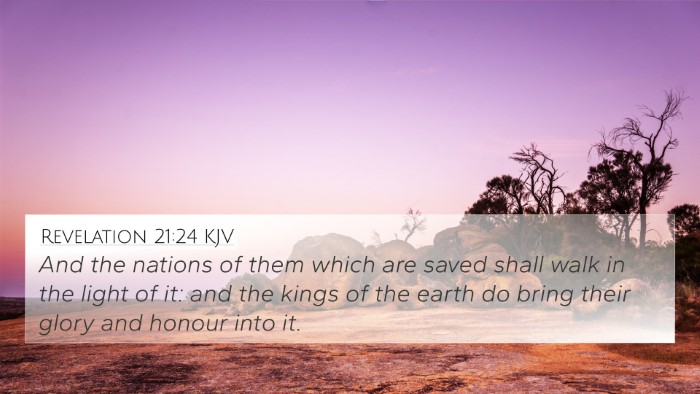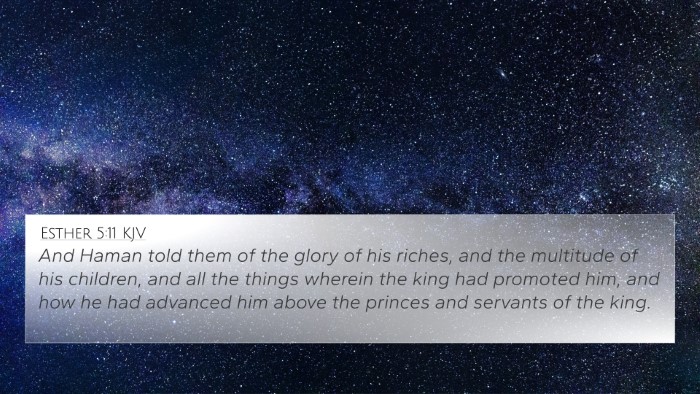Psalms 49:16 - Understanding the Verse
Psalms 49:16 states, "Do not be afraid when a man becomes rich, when the glory of his house is increased." This passage speaks to the heart of human concerns regarding wealth and societal status.
It encourages readers to reassess their attitudes towards material possessions and the transient nature of wealth.
Meaning and Interpretation
The essence of this verse is encapsulated in the idea that material wealth is temporal and should not induce fear or anxiety in believers.
Matthew Henry notes that it reflects a broader theme of the Psalm, which is to remind people not to envy the worldly prosperous but rather to focus on their spiritual well-being.
Albert Barnes emphasizes that the verse underscores the futility of relying on riches for happiness, as wealth can be fleeting.
Adam Clarke also highlights the importance of maintaining a righteous perspective toward wealth, arguing that it is better to be rich in faith than in material goods.
Thematic Connections
This verse touches upon several significant themes found throughout scripture, which can be closely examined through cross-referencing Biblical texts.
Below are some relevant Bible verses that relate to the central message of Psalms 49:16:
- Proverbs 11:4: "Riches do not profit in the day of wrath, but righteousness delivers from death." - This verse highlights the ultimate power of righteousness over riches.
- Matthew 6:19-21: "Do not lay up for yourselves treasures on earth... For where your treasure is, there your heart will be also." - A clear admonition to prioritize spiritual treasures over earthly possessions.
- 1 Timothy 6:9-10: "But those who desire to be rich fall into temptation... For the love of money is a root of all kinds of evils." - This cautions against the dangers associated with a desire for wealth.
- Luke 12:15: "Take care, and be on your guard against all covetousness, for one's life does not consist in the abundance of his possessions." - A warning about the dangers of greed.
- James 5:1-3: "Come now, you rich, weep and howl for the miseries that are coming upon you!" - This reinforces that wealth can lead to judgment rather than assurance.
- Ecclesiastes 5:10: "He who loves silver will not be satisfied with silver; nor he who loves abundance, with increase." - A profound observation on the insatiability of desire for wealth.
- Psalm 62:10: "If riches increase, do not set your heart on them." - A strong reminder to not let wealth consume one's thoughts and priorities.
- Luke 16:19-31: The parable of the rich man and Lazarus serves as a vivid illustration of the consequences of misusing wealth and neglecting the needy.
- Matthew 19:24: "Again I tell you, it is easier for a camel to go through the eye of a needle than for a rich person to enter the kingdom of God." - Emphasizing the spiritual risks associated with wealth.
Lessons from Psalms 49:16
The reflections from various public domain commentaries provide clarity on how to apply the teachings of this verse in everyday life.
Key lessons include:
- Perspective on Wealth: Recognize that material wealth is temporary and does not define one's worth or security.
- Focus on Righteousness: Cultivate a lifestyle that prioritizes spiritual richness and moral integrity over financial gain.
- Resisting Envy: Do not let the prosperity of others lead to envy, understanding that true fulfillment comes from a relationship with God.
- Caution against Temptation: Be aware of the temptations that wealth can bring, as it often distracts from deeper spiritual truths.
Cross-Referencing for Deeper Understanding
Engaging with cross-reference Bible study methods can greatly enhance understanding.
Tools for Bible cross-referencing such as a comprehensive Bible concordance or a cross-reference guide can assist in uncovering the interconnectedness found in Biblical texts.
This encourages believers to explore how different scriptures converse with each other, thereby enriching their understanding of God's message.
Conclusion
In summary, Psalms 49:16 serves as a vital reminder about the nature of wealth and its limitations.
Through understanding its connections with other verses, believers can develop a more profound appreciation for God's teachings on material possessions.
As we continue to study and apply these lessons, may we find our contentment not in what we possess, but in our relationship with the Lord.











